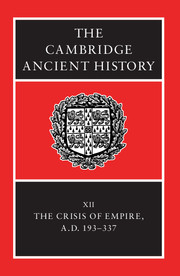Book contents
- Frontmatter
- PART I NARRATIVE
- PART II GOVERNMENT AND ADMINISTRATION
- 5 The army
- 6 The emperor and his administration
- 7a High classical law
- 7b Epiclassical law
- PART III THE PROVINCES
- PART IV THE ECONOMY OF THE EMPIRE
- PART V THE NON-ROMAN WORLD
- PART VI RELIGION, CULTURE AND SOCIETY
- Chronology
- Bibliography
- Index
- Topographical map of the Roman empire
- Map 2 The Roman empire in a.d. 211
- The Roman empire in a.d. 314
- The Rhine–Danube limes in the late second century
- References
7b - Epiclassical law
from PART II - GOVERNMENT AND ADMINISTRATION
Published online by Cambridge University Press: 28 March 2008
- Frontmatter
- PART I NARRATIVE
- PART II GOVERNMENT AND ADMINISTRATION
- 5 The army
- 6 The emperor and his administration
- 7a High classical law
- 7b Epiclassical law
- PART III THE PROVINCES
- PART IV THE ECONOMY OF THE EMPIRE
- PART V THE NON-ROMAN WORLD
- PART VI RELIGION, CULTURE AND SOCIETY
- Chronology
- Bibliography
- Index
- Topographical map of the Roman empire
- Map 2 The Roman empire in a.d. 211
- The Roman empire in a.d. 314
- The Rhine–Danube limes in the late second century
- References
Summary
The classical period of Roman law is conventionally taken to end in 235 with the death of Alexander Severus. That this chapter ends with a sketch of law for the next three quarters of a century or so, roughly up to the end of the reign of Diocletian in 305, therefore requires some explanation. By 235 the line of classical jurists and their writings had certainly come to an end. It would be wrong, however, to pronounce this the end of jurisprudence tout court. Schulz elegantly sums up the difficulty with that view: ‘If one limits one's view of legal science to its expression in the law schools and in literature, one is completely baffled by the sudden and unexpected collapse of classical jurisprudence in the second half of the third century, immediately after Ulpian; one can merely note the withdrawal of God's grace.’
In fact there was no sudden break or sharp discontinuity. The years from 235 to 300 to a significant extent represented the consolidation of trends which had already been developing in late classical law: both before and after 235 the jurists increasingly attended to topics other than those of private law, such as munera, penal and military law, fiscal law, cognitio; they concentrated on writing substantial elementary works, commentaries on the duties of officials and monographs; they paid greater attention to imperial law making; and had indeed increased involvement in making that law. Nor after 235 was there an immediate collapse in legal learning; had there been, it is hard to see how Diocletian could already in the early 290s have revived it sufficiently to produce the classicizing rescripts associated with his reign.
- Type
- Chapter
- Information
- The Cambridge Ancient History , pp. 200 - 211Publisher: Cambridge University PressPrint publication year: 2005
References
- 1
- Cited by

